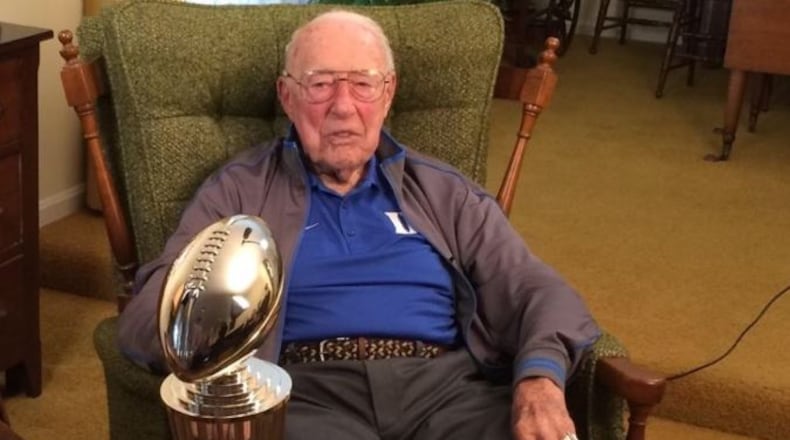He eventually played in the 1942 Rose Bowl for Duke University, and now, 75 years later, the 95-year-old is the last living player from that game.
After completing the regular season with a 9-0 record and No. 2 national ranking, Duke was selected to play Oregon State, 7-2, in the Rose Bowl. In the early 1940s, the champion of the Pacific Coast Conference got to choose its opponent for New Year’s Day.
Top-ranked Minnesota was the first choice, but the Western Conference, forerunner of the Big Ten Conference, did not permit its teams to play in bowl games until the 1946 agreement between the Big Ten and Pacific Coast Conference.
Smith, who played end on the offense and defense, said he and his Duke teammates were eager to play in the Rose Bowl under the sunny Southern California skies.
“We were excited,” he said from his Louisville, Ky. home. “We looked forwarded to it.”
Then, just three weeks before the game, the Japanese bombed Pearl Harbor, kicking off World War II and rewriting world history. After the war started, U.S. officials were concerned about another possible Japanese attack on the West Coast, so the Rose Bowl was canceled.
Eventually, Duke and Oregon State made contingency plans and moved the game to Duke Stadium, the university’s 35,000 campus stadium in Durham, N.C. Additional bleachers were borrowed from neighboring North Carolina and North Carolina State to accommodate the crowd. The 56,000 available seats — about half the capacity of the Rose Bowl Stadium — were sold in three days.
Leading up to the game after weeks of intense practice, Duke Coach Wallace Wade allowed his players to travel by train back home for Christmas. Smith believes that strategy backfired and interrupted the players’ practice routines.
“That chopped off our peak conditioning,” he said.
If that wasn’t enough, a cold rain days leading up to the game turned the Duke football field into a soggy mess. Smith said one of his teammates joked as the players ran onto the field that they should have worn boots instead of cleats. The playing conditions took away the Blue Devils’ team speed, said Smith.
When the Blue Devils fumbled the opening kickoff, it was the first of seven turnovers.
Oregon State, a two touchdown underdog, won the game, 20-16.
The celebration and disappointment didn’t last long for either team.
It was time to win a war.
Wade left his coaching job and enlisted in the Army, about 80 players from the 1942 Rose Bowl joined the military and four players — three from Duke and one from Oregon State — were killed in action.
“The war was inevitable,” Smith said. “We all knew we were going.”
In 1943, U.S. officials decided the West Coast was safe enough so the Rose Bowl returned to Pasadena. Meanwhile, in his senior year at Duke, Smith, named captain, injured his knee in the second game and was lost for the season.
After high school, it certainly appeared Smith was destined to play at Ohio State, following in his family’s footsteps. His uncle played baseball for the Buckeyes, and his father, L.J. Smith, and his older brother, Jack Smith, played on the OSU football team. But the younger Smith wanted to be known for more than being L.J.’s son or Jack’s brother.
He wanted his own legacy.
Plus, Smith was impressed by Wade and how he stressed academics over athletics. When Smith made his official visit to Duke, he met professors and coaches, in that order.
“You didn’t miss a class,” Smith remembered. “You were called to task for anything like that. That impressed me.”
He graduated from Duke in 1943, served in the Navy, then earned his master’s degree in industrial engineering from Purdue University in 1948. He retired about 30 years ago and now resides in Louisville near two of his three children.
His wife, Elsie, died in 2000 and they have three children: Pamela Gatz, of Denver, and Patti Meyer and James Smith, both of Louisville. He also has five grandchildren and three great-grandchildren.
Smith lives alone and up until a few months ago regularly played golf and never rode a cart. He was asked how it feels to be 95.
“Old as hell,” he said with a loud laugh. “Old age creeps up on you.”
About the Author

